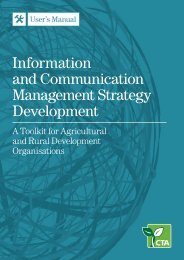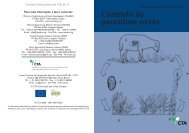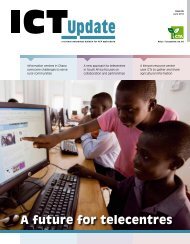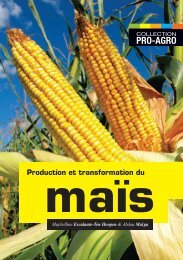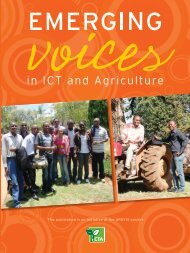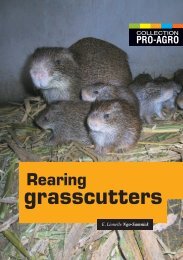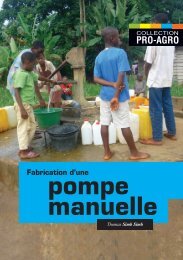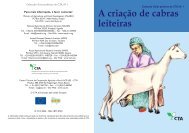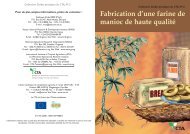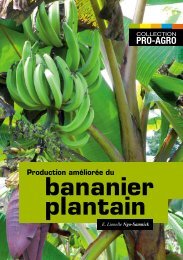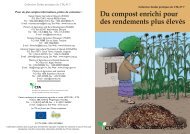Policy framework for Pastoralism in Africa
Policy framework for Pastoralism in Africa
Policy framework for Pastoralism in Africa
- No tags were found...
Create successful ePaper yourself
Turn your PDF publications into a flip-book with our unique Google optimized e-Paper software.
iv. The need to acknowledge the legitimate rights of pastoralists to pastoral lands by grant<strong>in</strong>gthem communal land ownership on a priority basis.In this regard, pastoralists should always be adequately compensated and/or their consent shouldbe required <strong>in</strong> case of expropriation of their communal pastoral land <strong>for</strong> bio-energy production,development of oil and m<strong>in</strong>eral deposits, and construction of basic socio- economic <strong>in</strong>frastructurese.g., roads, telecommunication l<strong>in</strong>es, power distribution l<strong>in</strong>es, health and education establishments,or any other <strong>in</strong>frastructure <strong>in</strong>tended to serve public <strong>in</strong>terest.It is important to note the positive actions taken <strong>in</strong> this direction at cont<strong>in</strong>ental, regional andnational levels. In this respect, the Framework and Guidel<strong>in</strong>es <strong>for</strong> Land <strong>Policy</strong> <strong>in</strong> <strong>Africa</strong> adopted<strong>in</strong> July 2009 by the AU Assembly of Heads of State and Government is a key po<strong>in</strong>t of reference,and <strong>in</strong>cludes measures designed to improve <strong>in</strong>digenous tenure arrangements.Strategy 1.5 Strengthen<strong>in</strong>g the role and rights of women <strong>in</strong> pastoral communitiesIn practically all the <strong>Africa</strong>n pastoral communities, women traditionally play an important role <strong>in</strong>livestock rear<strong>in</strong>g, process<strong>in</strong>g milk, sell<strong>in</strong>g dairy products and ma<strong>in</strong>ta<strong>in</strong><strong>in</strong>g households. Yet, they donot own valuable property, are the least educated, and are excluded from decision-mak<strong>in</strong>g processesand resource management and allocation. As a consequence, they benefit the least from pastoralism.<strong>Policy</strong> measures and <strong>in</strong>terventions have not specifically addressed this imbalance by creat<strong>in</strong>ggender equality and empower<strong>in</strong>g women and youths <strong>in</strong> decision-mak<strong>in</strong>g. As policies are developed,gender considerations must be taken <strong>in</strong>to account while ensur<strong>in</strong>g that women have equal rightswith respect to education, access and ownership of property and resources and active participation<strong>in</strong> development activities <strong>in</strong>clud<strong>in</strong>g peace build<strong>in</strong>g. Equal rights <strong>for</strong> women to <strong>in</strong>heritance shouldbe particularly en<strong>for</strong>ced. Measures concern<strong>in</strong>g women’s rights to <strong>in</strong>heritance and land ownershipconta<strong>in</strong>ed <strong>in</strong> AU Framework and Guidel<strong>in</strong>es <strong>for</strong> Land <strong>Policy</strong> <strong>in</strong> <strong>Africa</strong> should be fully applied <strong>in</strong>this case.Strategy 1.6 Ma<strong>in</strong>stream<strong>in</strong>g pastoral issues <strong>in</strong> poverty reduction programsa) The need to break the cycle of persistent poverty <strong>in</strong> pastoral communitiesEven though appreciable ef<strong>for</strong>ts are be<strong>in</strong>g made to ameliorate the challenges faced by pastoralcommunities, they still face alarm<strong>in</strong>g and worsen<strong>in</strong>g levels of vulnerability and poverty, protractedand severe <strong>in</strong>security, spatial isolation and political marg<strong>in</strong>alization. The persistence of poverty<strong>in</strong> pastoral communities relates to the <strong>in</strong>ability of most <strong>Africa</strong>n countries to satisfy the basic needsof the pastoral communities. Balanced and broad based development programs, adequately designedand implemented <strong>in</strong> the <strong>in</strong>terest of all the segments of the population, can be <strong>in</strong>strumental <strong>in</strong>eradicat<strong>in</strong>g extreme poverty.b) Mak<strong>in</strong>g pastoral development an <strong>in</strong>tegral part of susta<strong>in</strong>able developmentThe need to recognize pastoralism as part of <strong>Africa</strong>’s political, economic and cultural developmenthas been demonstrated throughout this document. Economically, pastoralists produce very substantialamounts of animal products, and contribute considerably to livestock trade. They adaptto economic and environment changes, draw<strong>in</strong>g on efficient traditional systems of governance andSecur<strong>in</strong>g, Protect<strong>in</strong>g and Improv<strong>in</strong>g the Lives, Livelihoods and Rights of Pastoralist Communities35




